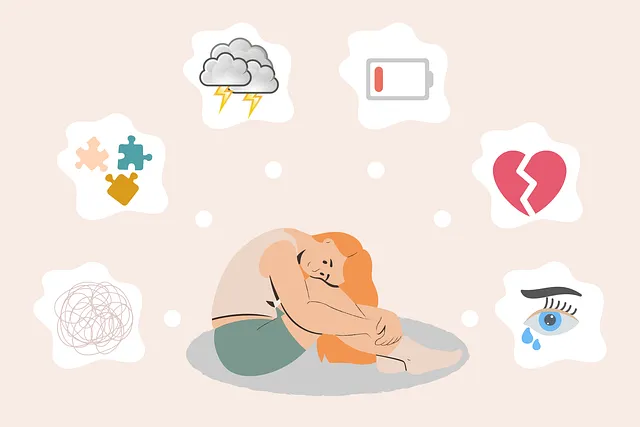Resilience is vital for healthcare professionals at Kaiser Permanente Norcal, offering the RFM framework (Resilience, Flexibility, Mastery) to combat stress and burnout. The dedicated Kaiser Permanente Mental Health Phone Number in Norcal provides access to expert advice and tailored exercises for diverse mental health needs. Challenges include accessibility and inclusivity, necessitating phone-based guidance and culturally competent approaches guided by Parker Institute's Mind Over Matter principles. Tailored resilience programs benefit all age groups, with workshops and initiatives empowering individuals through early intervention. Success is measured through tracking improvements in stress management, self-esteem, and coping skills development, enhanced by qualitative feedback from the Mental Wellness Podcast Series.
Resilience is a vital tool in navigating life’s challenges, and the RFM (Recovery, Flexibility, and Mastery) model offers a structured approach to building this strength. This article explores how the implementation of RFM exercises can enhance community mental well-being, focusing on specific strategies for different age groups. We delve into overcoming barriers and highlight a valuable resource, the Kaiser Permanente mental health phone number in Norcal Parker, providing support to those seeking resilience-building guidance. Each section offers insights into creating effective programs that foster adaptability and emotional resilience.
- Understanding RFM and Its Role in Resilience Building
- The Kaiser Permanente Mental Health Phone Number: A Resource for Norcal Parker Residents
- Identifying and Overcoming Barriers to Implementing Resilience Exercises
- Designing Effective Resilience Building Programs for Different Age Groups
- Measuring Success: Evaluating the Impact of RFM Exercises on Community Mental Well-being
Understanding RFM and Its Role in Resilience Building

Resilience is a vital asset in the healthcare sector, where professionals often face high-stress environments and demanding workloads. RFM, or Resilience, Flexibility, and Mastery, is a framework designed to enhance this crucial trait. It focuses on building mental fortitude, adaptability, and a sense of control over one’s life, all essential components for maintaining well-being. By fostering resilience, healthcare providers like those at Kaiser Permanente Norcal can better manage stress and prevent burnout, which is a significant concern among mental health professionals.
This approach encourages individuals to engage in self-awareness exercises, reflecting on their thoughts, emotions, and behaviors. It involves recognizing personal strengths and weaknesses and developing strategies to navigate challenging situations. The RFM model also promotes flexibility by teaching individuals to adapt to change, embrace uncertainty, and view setbacks as opportunities for growth. Moreover, it empowers healthcare providers to take control of their mental health, a critical aspect often overlooked in the fast-paced environment of patient care.
The Kaiser Permanente Mental Health Phone Number: A Resource for Norcal Parker Residents

For Norcal Parker residents seeking support for their mental health needs, the Kaiser Permanente Mental Health Phone Number stands as a vital resource. This dedicated line offers immediate access to expert advice and guidance, ensuring that individuals can connect with qualified professionals whenever they require assistance. The service is designed to cater to diverse mental health concerns, from general well-being and stress management to more specific issues like trauma and anxiety disorders.
The Kaiser Permanente Mental Health team comprises trained specialists who provide a range of services, including personalized therapy sessions, crisis intervention, and valuable mental health education programs. They also offer tailored Self-Awareness Exercises and Trauma Support Services to help individuals develop resilience and coping strategies. This comprehensive approach aims to empower residents with the tools needed to navigate mental health challenges effectively.
Identifying and Overcoming Barriers to Implementing Resilience Exercises

Implementing resilience exercises is a valuable strategy for improving mental wellness, but organizations like Kaiser Permanente norcal face challenges when introducing such initiatives. One significant barrier is ensuring accessibility and inclusivity. Not all individuals may be comfortable with traditional group sessions or find the time to engage in self-care practices. Overcoming this requires tailored approaches, such as offering phone-based guidance for those who prefer one-on-one support or incorporating exercises into existing patient care routines.
Additionally, cultural competency among healthcare providers is essential. The Parker Institute’s focus on Mind Over Matter principles can guide professionals in delivering effective mental health services. Through specialized training, providers can learn to recognize and address cultural barriers, ensuring that resilience-building exercises resonate with diverse patient populations. This inclusive approach fosters a stronger connection between care recipients and their mental wellness journey.
Designing Effective Resilience Building Programs for Different Age Groups

Resilience is a skill that can be cultivated across all age groups, from children to adults. When designing resilience-building programs, it’s essential to tailor them to suit each demographic’s unique needs and challenges. For instance, school-aged children may benefit from interactive workshops focused on emotion regulation and coping strategies, while teenagers could engage in group discussions centered around stress management and peer support.
At Kaiser Permanente Norcal, the mental health phone number serves as a vital resource for individuals seeking support. Recognizing the importance of early intervention, the organization has developed Public Awareness Campaigns to educate communities about resilience and promote well-being. These campaigns often include Stress Management Workshops designed to empower people with practical tools for navigating life’s challenges. By offering age-specific programs, such as parent-child workshops or youth-led initiatives, they foster a sense of community and encourage the development of resilient coping mechanisms.
Measuring Success: Evaluating the Impact of RFM Exercises on Community Mental Well-being

Measuring the success of resilience-building exercises is vital to understanding their true impact on community mental well-being. Organizations like Kaiser Permanente Norcal have recognized this, offering valuable resources through their mental health phone number and initiatives focused on community support. The effectiveness of these programs can be evaluated by tracking improvements in key areas such as stress management, self-esteem improvement, and coping skills development.
The Mental Wellness Podcast Series Production, a creative approach to engaging communities, plays a significant role in this evaluation process. By providing accessible platforms for sharing experiences and insights, it allows participants to reflect on their personal growth. This qualitative feedback complements quantitative data collected from surveys and assessments, offering a holistic view of the RFM exercises’ impact. Such comprehensive evaluations are essential to refining these programs and ensuring they meet the diverse needs of communities they serve.
The implementation of RFM (Resilience, Flexibility, and Mastery) exercises, as highlighted by the Kaiser Permanente mental health phone number for Norcal Parker residents, is a powerful tool in fostering community resilience. By addressing barriers and designing age-specific programs, we can effectively enhance mental well-being. The success of these initiatives is measurable through evaluating their impact on the community, ensuring that resilience building becomes an integral part of our collective toolkit to navigate life’s challenges.






